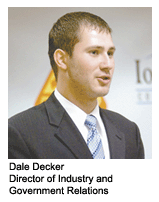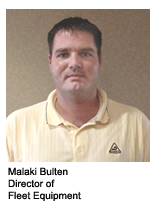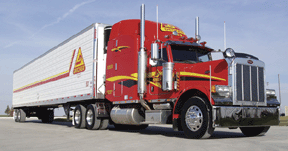By evaluating biodiesel in its operation, Decker Truck Line is finding answers to questions that could benefit the entire trucking industry
With a fleet of about 550 company owned tractors and 1,500 flatbed, dry, refrigerated and heated van, tanker and drop deck trailers, Decker Truck Line serves a wide range of customers. The Fort Dodge, Iowa-based, family owned and operated carrier transports steel and building materials, food products and dry freight, between the Midwest, southeast, west and south central U.S. and selected provinces in Canada from terminals in Iowa, Ind., Ohio, Ala., Fla. and Texas.

In the course of doing business the Decker fleet runs millions of miles, making it an effective test bed for alternative fuel options. It was that conclusion, says Dale Decker, director of industry and government relations, which led to the company’s 2 Million Mile Haul. Started about one year ago, the evaluation is using a group of 20 new identical tractors, ten powered by ultra low sulfur diesel (ULSD) and ten fueled by B20, a mixture of 20 percent biodiesel and 80 percent ULSD.
“The trucks run matching routes and carry matching loads,” Decker explains. “The only variable is the fuel and for added consistency all the biodiesel is supplied at our terminals by a tanker. The test will provide key data on a renewable fuel and a thorough look at how biodiesel performs in real-world conditions.
“There is a lack of information on the potential benefits of using biodiesel in on-highway trucking operations,” Decker adds. “While there have been laboratory evaluations, our trucks don’t run in labs. This experiment is the first comprehensive study to analyze what really happens with biodiesel and to explore its possibilities.”

For the 2 Million Mile Haul, Decker joined forces with Iowa Central Community College, the Iowa Soybean Association, the National Biodiesel Board, Caterpillar, the U.S. Department of Agriculture and the Renewable Energy Group, a company that develops biodiesel plants. Data on the trucks, which will be measured and compared at Iowa Central, will include engine wear, mileage, fuel consumption and the number of repairs.
Surprising results
With about 1.5 million miles of testing completed, Decker reports some initial findings were surprising.
“Fuel economy is about the same with both types of fuel,” Decker relates. “The difference between drivers is actually larger than the variance in fuel mileage between B20 and petroleum diesel. In addition, the fuel cost difference has been a wash, with one fuel or the other higher at times.”
“A very pleasant surprise midway through the test was that we to found out that the biodiesel powered engines are wearing quite well,” Decker continues. “Internal inspections using cameras have revealed that B20 powered engines are much cleaner than those using ULSD. Lubricity is clearly improved with biodiesel. In fact, we’ve found that using just two percent biodiesel can restore 66 percent of the lubricity that is lost with ULSD and bring wear rates in cylinders back into established parameters.”
If there is an economic argument to be made in favor of using B20 in on-highway trucks based on the data collected by Decker so far, it’s led by the potential for a 20 percent reduction in engine wear.
“It’s not than one fuel may be less expensive than the other,” Decker says. “Instead, less engine wear means fewer problems and therefore less downtime, as well as the potential for higher resale values.”
The Decker test may also benefit engine manufacturers, Decker notes, by eliminating repairs that are made under warranty.
“Caterpillar, for example, supports biodiesel use but wants to see a more robust technical fuel standard to assure quality,” Decker states. “Their participation in the 2 Million Mile Haul is a big step toward achieving that goal. Overall, this evaluation has a huge potential for our company and others.”

The Decker fleet’s 550 company tractors are complemented by the services of approximately 150 dedicated owner-operators, include mostly Peterbilt models. In the operation are Model 379 with extended hood versions with 63- and 70-inch sleepers; Model 386 day cab and sleeper units; Model 387 midroof versions with 52-inch sleepers and highroofs with 70-inch sleepers, and Model 388 and Model 389 sleeper-equipped tractors. In addition, the fleet operates some Freightliner Columbia CL112 models with 36- and 48-in. sleepers.
Decker’s 1,500 trailers include 48-ft. by 96- and 102-in. Great Dane and Wilson RoadBrute flatbeds and Wilson drop deck models. The fleet’s refrigerated trailers include 53-ft. Great Dane Super Seal XL and Utility 3000R models. All of the reefers are equipped with Carrier refrigeration units, including Ultima XTC Advance and new X2500A models, and some units have satellite tracking with temperature monitoring capability. All dry and refrigerated vans in the fleet are fitted with sliding tandem air-ride suspensions for flexibility, ride and cargo protection.
Great pride
“We take great pride in the fleet,” states Malaki Bulten, director of fleet equipment, “which is why we regularly upgrade our equipment with the highest quality products the industry has to offer. With a projected trade cycle of four years/500,000 miles for tractors, the average age of our company power units is only two years. Refrigerated trailers are traded every seven years and flatbeds are replaced on a seven- to ten-year cycle.”
“For the most part,” Bulten continues, “our fleet is standardized. While we operate different tractor and trailer models, most of the vehicles have many of the same components. We know what works for each part of our operation and we’re always looking at fine tuning things to improve efficiency and lower costs.”
Maintenance costs, along with resale value and warranty, are main considerations for Decker as it makes purchasing decisions, Bulten reports. “Those things are all factored into our trade cycle decisions,” he says. “At the same time, we cut no corners when it comes to servicing our tractors and trailers.”
Jeff Gallogly, director of maintenance at Decker, reports that all vehicles are fully inspected at least every 90 days. Tractor maintenance is based on OEM recommendations and includes an inspection at 8,000-mile intervals.
Trailers are also on OEM-based preventive maintenance schedules but are also checked each time they enter a company facility. Maintenance schedules are managed using PACCAR supplied maintenance software. In addition, the carrier operates a trouble desk around the clock to ensure that a driver with a problem on the road receives quick assistance.
Secret of success
“Throughout our company,” says Dale Decker, “we have drivers, technicians and management personnel who put forth the extra effort required of those who strive to be the best. The secret of our success has been the mutual loyalty that exists between Decker, its employees and its customers.”
From its humble beginning in 1931 with a single Model B Ford, Decker Truck Line has grown to service a much larger number of customers while still proudly serving some of the same shippers today that it served in the early 1930s.
“We realize that a company must be profitable to adequately maintain its equipment and facilities and to employ qualified personnel,” Decker states. “It is our belief that if we don’t plan for the future we will not have a future. It is for this reason that we strive to provide the quality of service today that will ensure our existence in the years to come.”
